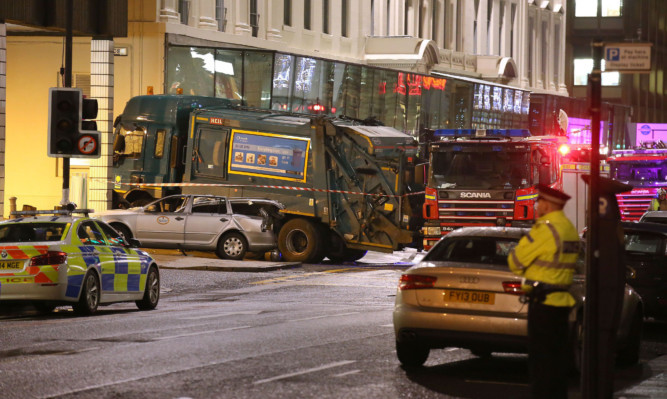The passengers on board a bin lorry that crashed killing six people did not have enough time to stop it from mounting the pavement, a collision expert has told a fatal accident inquiry.
Crewmen Matthew Telford and Henry Toal only had around five seconds to react when the council vehicle started deviating from the road in Glasgow city centre, Mark Hill told the inquiry.
Mr Hill, from the Transport Research Laboratory, said yesterday that it took just 19 seconds for the tragedy to unfold three days before Christmas.
Continuing to give evidence today he said his calculations showed the vehicle was travelling at 25.9mph when it mounted the pavement on Queen Street.
His report on the collision said the passengers were “physically obstructed” from properly reaching driver Harry Clarke, who the inquiry has heard appeared unconscious at the wheel.
Mr Hill also said the two crewmen had a more restricted view and were “unlikely to have foreseen how long the event would last”.
His expert report, read at the inquiry at Glasgow Sheriff Court, stated: “It appears to me that there was insufficient time for Mr Telford and Mr Toal to avert a collision with the building line.”
Solicitor General Lesley Thomson, who is leading the inquiry, asked Mr Hill: “The reaction time then is much shorter than the 19 seconds it took (for the entire event)?”
Mr Hill said: “The available time to react was much shorter, yes.”
The collisions expert was later asked if there was time for the passengers to intervene once the bin lorry returned to the road and crashed into a hotel.
Mr Hill told the inquiry it may have been possible to pull the handbrake, but that it could have made the vehicle lose control in another direction.
Erin McQuade, 18, and her grandparents Jack Sweeney, 68, and Lorraine Sweeney, 69, from Dumbarton, West Dunbartonshire, were struck and killed by the lorry.
Stephenie Tait, 29, and Jacqueline Morton, 51, both from Glasgow, and Gillian Ewing, 52, from Edinburgh, also died.
